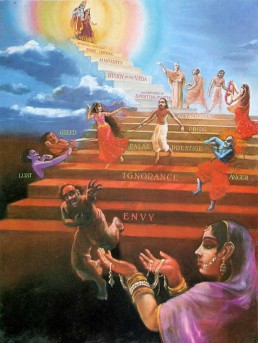Comparing and contrasting these four above-mentioned groups among themselves, the Lord declares here that the Jnani, who with a steadfast mind, surrenders himself to the Self, with an integrated heart of total devotion, which is not dissipated by other parallel aspirations, represents the best. Single-pointedness of mind can be gained only when the goal of the meditator is fixed and steady. The unbroken and all-out aspiration of the seeker to reach his own Real Nature, the Self, is called single-pointed-devotion (Eka bhaktih).
This is possible only when one withdraws oneself totally from all other extrovert demands of the lower nature in him. In the case of a Jnani, therefore, the Spirit is invoked not for the acquisition of anything, but for the annihilation of all the self-destructive channels through which his spiritual dynamism gushes out day-to-day, only to get wasted on the dry rocks of the world of hallucination. Naturally, therefore, the Self, as a personification in Krishna, declares in the Geeta that the Jnanis are the highest and the best among the living kingdom who reach the PORTALS OF TRUTH with their individual demands and aspirations, to experience their final merger in the Self.
To the truly wise “SUPREMELY DEAR AM I.” Love is measured by the amount of identification the lover has gained with the beloved. Self-surrender is the tune in which the song of love is truly sung. Selfessness is the key in which the duet of love is played. Love demands “giving without expecting any return,” at all times, in all circumstances. With this understanding of the nature of true love, when one tries to understand the attitude of the Jnani towards the Self, it is true that a Jnani alone knows how to love wholly, completely.
One-sided love never culminates in any consummation. Man may approach the Spiritual Centre in himself in an attitude of discrimination and surrender — with all his aspiration and love — but if it is not reciprocated by the Spirit, it might become as tragic as the case of the Greek boy who fell in love with his own reflection. Here, when Krishna declares, “AND HE IS DEAR TO ME,” a great psychological truth has been expounded. It is the Eternal Law that love, with no strings attached to it, can not only order its own fulfilment, but can also convert even the base into the noble by its silent persuasions and mysterious charms.
Scientifically viewed, it is an observable fact that if a mind is powerfully charged with a certain emotion — be it sorrow, hatred, jealousy, love or kindness — it can bring about sympathetic vibrations of similar emotions in the chambers of the hearts that come near it. When one full of hatred approaches us, he can influence and fill our hearts to the full with hatred. So too, if we can give the required dose of pure and sincere love, unmotivated by any desire or selfishness, it is a law that even the bitterest enemies, with their hearts full of hatred, can be forced to reflect nothing but love towards us. This psychological truth, in all its implications, has been brought out vividly when the Geeta states that even the Infinite and Eternal Truth has, helplessly, to come under the charm of pure and selfless courting of the meditator with Eka bhaktih.
THEN, ARE NOT THE THREE OTHERS, THE DISSATISFIED AND THE REST, DEAR TO VASUDEVA? NOT SO. THEN HOW IS IT?

